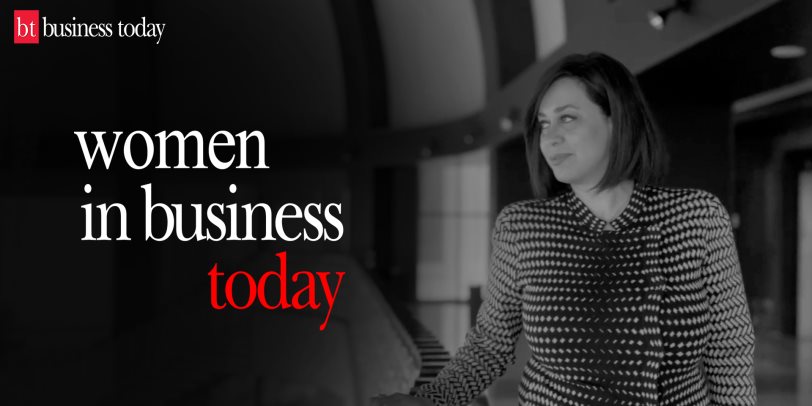Financial literacy and women’s empowerment towards economic growth with Mariam Elsamny
A trailblazing woman in finance, Mariam Elsamny, Head of Consumer Banking at FABMISR, balances empathy and analytical decision-making with ease as she accelerated the bank’s digital transformation

A trailblazing woman in finance, Mariam Elsamny, Head of Consumer Banking at FABMISR, balances empathy and analytical decision-making with ease as she accelerated the bank’s digital transformation.
Sharing her insights on empowering women in the banking and financial sector, Elsamny discusses the importance of education and financial literacy in enabling more women to join the sector, highlighting her personal experience as a woman in leadership, and emphasizing the strengths that women can bring to the workplace.
As a successful woman in the banking industry, what do you think needs to be done to encourage and empower more women to join the financial sector?
Women’s empowerment is a topic very dear to my heart. Allow me to begin by defining women's empowerment.
Women or female empowerment may be defined in several ways, including accepting women's points of view or perspectives and raising the status of women through education, awareness, literacy, and training. Women's empowerment equips and enables women to make life-changing decisions.
In an everchanging and competitive world, one of the key factors to empowering more women to join the financial sector is education and, specifically, financial literacy.
Providing women with education early on empowers and enables them to take on roles in the financial sector, or any sector for that matter.
Promoting women's inclusion in the banking sector at an early career stage has also generated and promoted talent over the years, and we are now seeing more and more women in leadership positions.
Do you feel that being a woman has impacted your career, and as a woman, what advantages or strengths do you believe you bring to the role?
I was fortunate to be able to take on leadership roles of various degrees from an early age and, thankfully, I have never faced a situation whereby being a woman was a deterrent.
As a woman, I believe one of the key advantages or strengths that I was able to bring to the workplace is the true ability to be “tough on the outside yet soft on the inside”.
As a leader, you need to show strength and have the ability to inspire people around you. You need to be able to make confident business decisions at times, without involving your emotions, but still be empathetic, however, it is important to remember to not let empathy cloud your decision-making process.
And I do believe that I was able to bring this balance throughout my career. It takes training and focus to strike this balance, especially since women tend to be viewed as having a “softer and emotional” character, hence it's crucial to develop yourself to be able to strike this balance.
Women are often underrepresented in leadership roles within the sector, what do you see can be done to increase the representation of women in top decision-making positions?
While this perception is somewhat true, it is slowly but surely changing. We have seen rapid progress and change within the sector over the past few years.
Today, there are many renowned women who have reached very senior positions – CFOs, CEOs, CROs, and board members – the change is happening, with many initiatives being implemented by the government, and global institutions such as the World Bank, and the International Finance Corporation (IFC), among others to support it.
To empower women further and ensure that they reach and attain leadership roles, I believe that there needs a strong alignment between the public and private financial sectors’ leadership as well, which we are currently witnessing. For example, the central bank has rolled out mentoring programs exclusively for women through the Egyptian Banking Institute (EBI). The central bank has also endorsed and encouraged the fact that women are essential as board members in banks – this indicates that positive steps are being taken in this direction.
As an organization, we at FABMISR ensure that a balanced female-to-male ratio is met within the senior executive positions as well as middle management teams.
It is also important to focus on areas where we see women at junior levels having some difficulty reaching senior-level positions – such as remote areas/governates aside from Cairo and Alexandria, our main two Egyptian cities. This is primarily driven by the social and cultural barriers to women in the workplace. As such, banks should start establishing programs specifically aimed at these areas.
What are some of the challenges women face when working in the banking and financial sector, and how can these be addressed to improve gender diversity and inclusion?
As I previously mentioned, the progress of women within the banking sector has taken leaps and bounds and is on the right track. The only key challenge I still see remaining is that some women at times may not be able to take on certain roles which are stereotyped as “male-led” roles.
Again, we tend to see this more in remote areas where it is culturally not yet accepted or common for women to take on leadership roles. As such, I believe it is vital to pay special attention and focus on those areas. It is important to work with key institutions and the government to promote women's engagement, women's education, and women's financial inclusion further.From what I’ve witnessed firsthand, I believe that banking and financial institutions need to ensure that they have the right focus and Key Performance Indicators (KPIs) to ensure the right ratio of women in leadership positions.
In your experience, how have you seen women’s economic empowerment contribute to the growth of the banking sector?
One of the important factors that will lead to women's empowerment in Egypt is financial independence. Women need to be empowered economically; this will make women self-reliant and give them the freedom to choose.
Once a woman becomes financially independent and can exercise her choices, she can also help her mother, sister, daughter, and other women in society to become empowered. This will elevate women’s position in society and will result in equality. In turn, this will certainly bring growth to the banking sector. As more and more women are financially empowered, this will increase the productive population in the country, thereby enhancing the financial sector's growth.
What initiatives do you see as vital to improving women’s economic role and empowerment? What more can be done?
Banks play a major role in writing Egypt’s growth story, bringing much-needed change across the country. They are also playing a pivotal role in women's empowerment.
Being one of the primary pillars of the Egyptian economy, banks have a pivotal role to play in women's empowerment. Be it schemes pertaining to educational financing at an early age or financial assistance for setting up a source of income and livelihood, banks are vital in enhancing the financial inclusion of women in the Egyptian economy.
Women's empowerment is an important component of Egypt’s socio-economic growth. The government and many other agencies are undertaking steady measures to further improve the situation through various policies focused on social reforms and generating employment opportunities.
The Egyptian banking sector is empowering women in multiple ways by providing individual bank accounts, educational loans, financial assistance for female entrepreneurs, training, and empowerment.
Women are more likely to save, allocate, and invest money to be protected against unexpected expenses. Once women have bank accounts, they have a natural tendency to invest in financial solutions that provide them with financial returns and financial security.
An educated woman is possibly the best way to ensure that the next generation is also educated and well-informed, encouraging women to practice the trade of their choice as well, with education being a key driver of women’s empowerment. Many banks offer educational assistance schemes for women at preferred terms and lower interest rates.
The participation of women as compared to men in formal banking is significantly lower. Many initiatives being undertaken by the government and various NGOs are slowly bringing about change, yet a great deal remains to be done. We still have a long way to go before we can reach a desirable level of holistic financial inclusion for women. In an effort to improve this, the public and the private sectors need to start thinking of additional steps to tackle low informal wages in the informal sector and female illiteracy.
The banking sector plays a critical role in spearheading the financial inclusion of women in the Egyptian economy, including supporting female-owned enterprises.
With their entrepreneurial skills, today a large number of women are successfully managing small and large businesses. In support of this, banks are offering loans to such businesses to help women to grow their ventures. Many banks support micro, small, and medium-sized enterprises (MSMEs) specifically run by women under various programs.
There have been, and still exist, several socio-cultural barriers to achieving true financial inclusion for women, and the banking sector plays a critical role in spearheading the financial inclusion of women in the Egyptian economy. Now, there are many women-centric or exclusively-for-women financial schemes introduced by banks and financial institutions to make banking services accessible to women everywhere – cutting across geographies and socio-economic classes – adding impetus to women’s empowerment. Financial inclusion is certainly the first step to women’s empowerment.
For training, many banks have initiated special training programs for their female employees. Training enables them to get knowledge of different aspects of finance, as well as mentorship on how to become a successful leader.
In terms of employment, banks offer many opportunities for women. Further development in women’s education rates and improved financial inclusion will result in the growth of female employees in rural areas too. We now see many women reaching senior and top-most positions in state-owned as well as private banks.
Do you have a mantra or saying that you would like to share with other ambitious women that has been meaningful to you?
A woman is a mother, sister, wife, daughter, and much more. So, a woman has a unique side to her which is more empathetic by nature and is one of the key advantages that women bring to the workplace. However, this can be a double-edged sword as it can be an advantage and can also be a disadvantage if not managed carefully and smartly. A woman needs to be confident, charismatic, and wary of her emotional side.
I am truly optimistic about how Egyptian women’s development is on the rise – and I am confident that in the next few years, we will collectively reach greater heights of success across all sectors – with the help and inclusion of more women.





